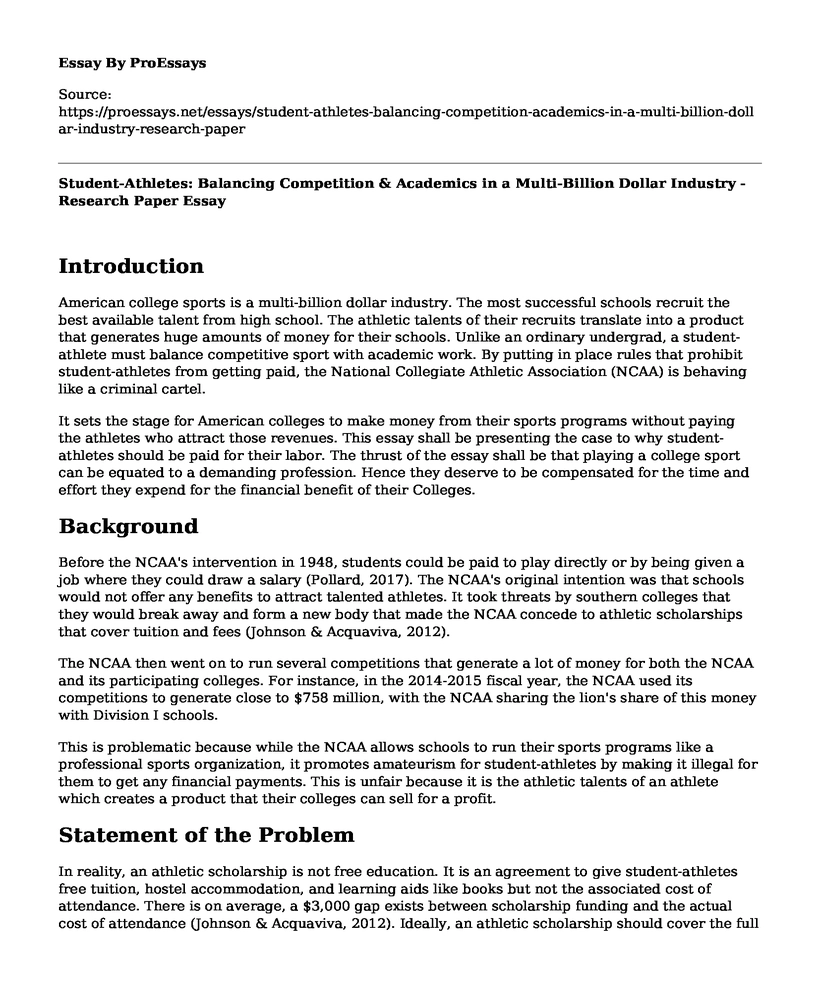Introduction
American college sports is a multi-billion dollar industry. The most successful schools recruit the best available talent from high school. The athletic talents of their recruits translate into a product that generates huge amounts of money for their schools. Unlike an ordinary undergrad, a student-athlete must balance competitive sport with academic work. By putting in place rules that prohibit student-athletes from getting paid, the National Collegiate Athletic Association (NCAA) is behaving like a criminal cartel.
It sets the stage for American colleges to make money from their sports programs without paying the athletes who attract those revenues. This essay shall be presenting the case to why student-athletes should be paid for their labor. The thrust of the essay shall be that playing a college sport can be equated to a demanding profession. Hence they deserve to be compensated for the time and effort they expend for the financial benefit of their Colleges.
Background
Before the NCAA's intervention in 1948, students could be paid to play directly or by being given a job where they could draw a salary (Pollard, 2017). The NCAA's original intention was that schools would not offer any benefits to attract talented athletes. It took threats by southern colleges that they would break away and form a new body that made the NCAA concede to athletic scholarships that cover tuition and fees (Johnson & Acquaviva, 2012).
The NCAA then went on to run several competitions that generate a lot of money for both the NCAA and its participating colleges. For instance, in the 2014-2015 fiscal year, the NCAA used its competitions to generate close to $758 million, with the NCAA sharing the lion's share of this money with Division I schools.
This is problematic because while the NCAA allows schools to run their sports programs like a professional sports organization, it promotes amateurism for student-athletes by making it illegal for them to get any financial payments. This is unfair because it is the athletic talents of an athlete which creates a product that their colleges can sell for a profit.
Statement of the Problem
In reality, an athletic scholarship is not free education. It is an agreement to give student-athletes free tuition, hostel accommodation, and learning aids like books but not the associated cost of attendance. There is on average, a $3,000 gap exists between scholarship funding and the actual cost of attendance (Johnson & Acquaviva, 2012). Ideally, an athletic scholarship should cover the full cost of college attendance.
Most student-athletes are from improvised backgrounds. The current system requires them to pay between $8,000 to $12,000 out of pocket to bridge to gap between their scholarships and the cost of attendance. The NCAA, therefore, damages the future of these students because they are pushed to drop out of college to chase a professional contract before they graduate.
Why Student-Athletes Need to be Paid
The first argument in favor of student-athletes getting paid is that it is their labor which creates the product which generates revenues for the NCAA and their members. To deny them a salary is unfair especially since, an athletic scholarship is renewed per year. It may be terminated if the coaching staff doesn't think a player can cut it anymore or worse still if the student-athlete gets an injury that ends their colligate career.
Given the conditional nature of athletic scholarships, the danger of career-ending injuries, and the poor backgrounds most student-athletes come from, giving them financial compensation for their efforts makes sense. The second argument in favor of student-athletes getting paid is that the current NCAA rules damage the welfare of student-athletes because it encourages them to drop out of school. There is a considerable gap between what an academic scholarship covers and the actual costs of attending college.
Most student-athletes are from poor backgrounds. Unless the school breaks NCAA rules without getting caught, most student-athletes are forced to drop out and join the professional ranks. Getting a college degree is one of the ways of breaking inter-generational poverty (Sawhill, 2006). It is also a safety net in case a student-athlete doesn't go pro.
The final argument in favor of student-athletes getting paid I that unlike an ordinary undergrad, a student-athlete must balance competitive sport with academic studies. They must pass their classes and spend 40 to 60 hours per week practicing, traveling, and playing games. Playing a college sport, especially in Division I programs is like working a full-time job while at the same time going to school.
Conclusion
By putting in place rules that prohibit student-athletes from getting paid, the NCAA is behaving like a criminal cartel. It sets the stage for American colleges to make money from their sports programs without paying the athletes who attract those revenues. Playing a college sport can be equated to a demanding profession. Student-Athletes deserve to be compensated for the time and effort they expend for the financial benefit of their Colleges.
References
Johnson, D. A., & Acquaviva, J. (2012). Point/counterpoint: Paying college athletes. The Sport Journal, 15(1). Retrieved from https://go.galegroup.com/
Pollard, M. (2017). Amateurism and the NCAA: The Controversy (a Legal Review). Retrieved from https://ecommons.udayton.edu/uhp_theses/128/
Sawhill, I. V. (2006). Opportunity in America: The role of education. Brookings Institution.
Cite this page
Student-Athletes: Balancing Competition & Academics in a Multi-Billion Dollar Industry - Research Paper. (2023, Mar 14). Retrieved from https://proessays.net/essays/student-athletes-balancing-competition-academics-in-a-multi-billion-dollar-industry-research-paper
If you are the original author of this essay and no longer wish to have it published on the ProEssays website, please click below to request its removal:
- Effective Learning of the Severely Disabled Students
- Strategies in Teaching Content Area Learning, Vocabulary, and Math
- Critical Thinking on Business Ethics Paper Example
- Essay Sample on Life Experience
- New Insights Gained Based on Results of The "Locus of Control" Assessment
- Essay Example on Online Education: Get Your Degree With Ease!
- Cultural Awareness at American River College







